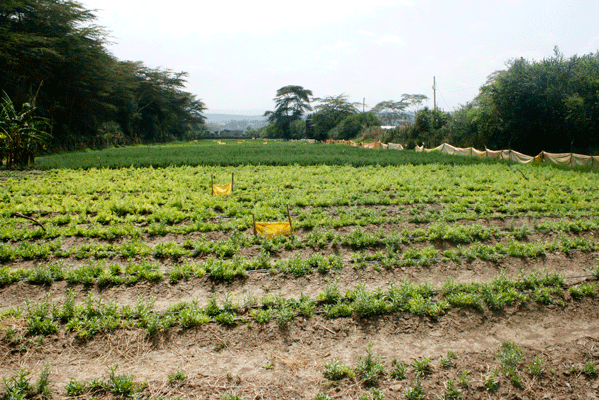
Herbs demand lead Norflora to shift from vegetables
A burgeoning European appetite for herbs by a health-conscious middle class is driving the growth of culinary herbs both in Kenya and in other countries. This has opened a golden opportunity for many farmers in the country. It is believed that these herbs add distinctive flavor and spicy taste to food, and also contain many anti-microbial substances that helps keep food protected from microbes.
Norflora Kenya limited which began farming in 2000 on a five acre piece of land at Kihoto, Naivasha have tapped into this meteoric rise of consumption of herbs globally by growing six varieties; Rosemary, Mint, Thyme, Teragon, Sage and Oregano According to Julian Ndambuki who is the Director of the Company, they used to cultivate vegetables; beans and baby corns before shifting to herbs.
Most herbs are pests and mosquito repellent, which means they are rarely attacked by pests apart from white flies. They control whiteflies by spraying, use of yellow traps and planting marigold flowers in between the herbs to acts as a repellant due to its pungent smell that it produces.
Norflora grows their herbs in open fields. Land preparation involves ploughing to obtain a fine tilth, which is followed by application of organic matter such as well-rotten chicken manure, or recycled green waste to improve the fertility of the soil. Beds are then raised to ensure a good drainage. “Afterwards we lay drip lines and irrigate the land before we embark on planting of certified propagated seedlings at a space of six centimeters between the plants. We draw our water from the lake which is just nearby”, she explained.
Ndambuki is quick to note that synthetic fertilizers are not used to grow the herbs as their repeated applications results in a toxic buildup of various chemical elements in the soil. These toxic chemicals can eventually make their way into the leaves of the herbs hence when consumed become toxic to the body. Long-term use of chemical fertilizer can also change the soil pH, upset beneficial microbial ecosystems, and increase pests among others.
After two weeks of planting, good crop management practices come in handy. The company sprays their herbs with foliar fertilizers to boost growth. “We irrigate them twice in a week to maintain their tenderness. We also weed during the first weeks and stop after they have formed a canopy which controls the weeds from shooting up, thus weeding ends up causing injuries to the plants”, Ndambuki highlighted.
When the crops are two months of age, vegetative foliar feeds are applied for flowering and fruiting purposes. “Herbs take three months to be ready for harvesting, we sell our herbs to Netherlands, United Kingdom and Dubai,” Ndambuki opined.
Harvesting is done twice a week depending on their clients’ orders and entails cutting the oldest stems individually with secateurs and putting them in crates. The company has organized transport and a collection channel done in a shade which ensures that the herbs do not wilt from the rays of sunlight.
Once harvested, the produce is rushed to the pack house where they are sorted and put in a cooler to maintain their tenderness before being packaged and labeled. They harvest 200 to 300 Kilograms of herbs.
The biggest challenge they encounter is post harvest losses. “Herbs are very delicate due to their fragile nature and most of losses emanate from handling. When not properly stored, they de-hydrate,” She pointed out.
In a bid to acquaint farmers who flock to the farm with farming practices that meet international standards, Norflora trains on how to adhere to good agricultural practices. Such farming practices includes: pest management, pesticides to use, use of certified propagated materials and traceability. “We take time to explain to the farmers that the export market is very particular about the quality of the produce being sold to them, which is determined by what we do in our farms. Buyers sometimes make ad hoc visits to farms to track the growing conditions of herbs”, Julian explained.
Currently, the farm is in the process of diversifying into basil farming and establishing an out growers association where it will contract farmers to grow for them as the demand keeps on increasing and the market keeps on enlarging. They are GlobalGap certified


